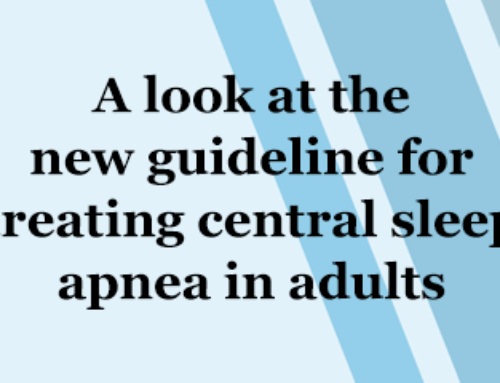The AASM Early Career Physician Assembly is an online community for members who are early in their sleep medicine careers, giving them an opportunity to network and learn from colleagues with a similar professional background. AASM member students, fellows, trainees, and physician members under 40 years of age are automatically included in the assembly.
For this second article in a two-part series, leaders of the assembly asked AASM members what they wish they had known when transitioning from a fellowship to their new career. We feature Pamela Hamilton-Stubbs, MD, and Radhika S. Breaden, MD, in private practice, and AASM Board of Directors member David Kuhlmann, MD, in a hospital-employed position. They described their challenges and successes and provided advice to new sleep practitioners.
Pamela Hamilton-Stubbs, BSN, MD, CEO of Sleep and Total Wellness Institute, LLC, in Richmond, Virginia
What was your path going into private practice?
Prior to completing my studies in sleep medicine, I completed an internal medicine internship, pediatric residency, adult neurology residency, and child neurology fellowship. As a sleep specialist, I wanted to serve patients from a wide range of ages, for example, infants to geriatrics. There was no sleep practice in Richmond, Virginia, offering care to patients in this range of ages. In 1998, I opened The Sleep Clinic for Children and Adults and provided this service to my community.
Given <50% of physicians go into private practice, what inspired you to practice on your own in the current environment?
Continuing as a private practitioner allows me flexibility to address the social determinants of health that adversely impact the health and sleep of my patients. I am honored to work with individuals, governmental agencies, and organizations to help eliminate health disparities and increase health equity.
What obstacles did you have to overcome to be successful in your practice?
My biggest obstacle to establishing a medical practice was a lack of business skills. I earned a mini MBA from a local university. I found business mentors through the university and the Small Business Administration. I am very blessed that my family and colleagues are committed to my success.
Radhika S. Breaden, MD, MPH, DABMS, Pacific Sleep Program in Portland, Oregon
What was your path going into private practice?
I did not plan to go into private practice initially. I had planned to be part of a large hospital organization as my family worked there when I was growing up, so I always expected to be in a large, multispecialty organization. I practiced internal medicine for 10+ years before board certifying in sleep medicine and had been working in the hospital system in internal medicine. Once I joined the sleep medicine group, I found that the care was more fragmented than I expected (some parts of sleep medicine in neurology, some in pulmonology, some in psychiatry), and there were significant delays in care due to bureaucratic limitations, staffing limitations and other issues. Patients had a difficult time navigating the system. After I left that practice, I joined one of the larger private sleep medicine practices in the area. It was a different world of sleep medicine care, and I was able to see patients in a timely manner, get sleep studies and order equipment in a very timely manner, and I felt that this helped the patients to be more successful in their care.
Given <50% of physicians go into private practice, what inspired you to practice on your own in the current environment?
I am very happy to be able to provide the quality of care that makes me comfortable and gives me joy in my practice of sleep medicine. We control the length of appointments, schedules, and staffing.
What obstacles did you have to overcome to be successful in your practice?
I encountered several financial and regulatory obstacles, many of which we all face: contract negotiation, staffing challenges, supply costs and challenges. Running a private practice means wearing several different hats — manager, contract negotiator, human resources specialist, IT, and customer service specialist, in addition to being a physician. I don’t have all the support systems that a large organization has to do all these things, and some of them had a steep learning curve. However, the reward of controlling one’s own schedule and quality of care make it worth it. I am happy to be with colleagues who care about sleep medicine as much as I do.
David Kuhlmann, MD, Bothwell Regional Health Center in Sedalia Missouri
What impacted your decision to choose a hospital-employed position as opposed to starting your own practice?
Coming out of my sleep fellowship, I knew that I wanted to be 100% sleep medicine. If I had started my own practice, I would not be 100% sleep medicine, because I would be spending a lot of time on the business side of things. I had no experience or desire to start a business. I love being a part of a health system! Sleep medicine is so integral to a patient’s overall health and quality of life. Working together with other providers in my health system is the best way for me to help people, which is the whole reason that I went into medicine to begin with.
What are some of the factors that went into your decision-making?
Medical school, residency, and my sleep fellowship were all so much work! While my training experience was amazing, I never received any training on how to start my own practice. In addition to not having any experience, I wasn’t too interested in taking out a business loan given my medical school debt. I figured that I could start off establishing myself in a 100% sleep practice, and then build up experience and move to a different practice environment if the employed practice model was not a good fit for me.
What are some of the benefits of being hospital employed as opposed to other opportunities (private practice, academics, etc.)?
I have done a bit of sleep research, but my love is seeing patients. Working at a community hospital, I am not expected to publish. I am also a part of a community, both in terms of the community itself, and the medical community. I get inpatient sleep medicine consultations, which is an important time in a patient’s life as far as making lifestyle changes. Of course, paid time off and retirement benefits are another benefit of an employed practice.
What advice would you give to fellows or other physicians when looking for a hospital-employed position?
If the hospital already has sleep medicine as an existing line of service, get to know the staff that you would be working with. If the hospital does not already have an established sleep medicine practice, understand from your administration what the expectations would be to build your practice and what support you would have from the medical community. Most importantly, when choosing an opportunity, ensure that you will be able to practice medicine the way that you want to practice medicine. When you love what you do, success will follow.
This article appeared in volume eight, issue one of Montage magazine.





